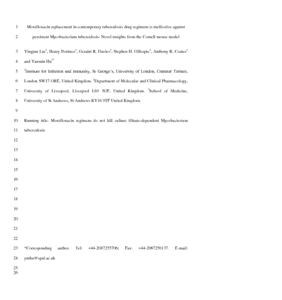Liu, Y; Pertinez, H; Davies, G; Gillespie, SH; Coates, AR; Hu, Y
(2018)
Moxifloxacin Replacement in Contemporary Tuberculosis Drug Regimens Is Ineffective against Persistent Mycobacterium tuberculosis in the Cornell Mouse Model.
Antimicrobial Agents and Chemotherapy, 62 (7).
e00190-18.
ISSN 1098-6596
https://doi.org/10.1128/AAC.00190-18
SGUL Authors: Hu, Yanmin
![[img]](http://sgultest.da.ulcc.ac.uk/109738/9.hassmallThumbnailVersion/166232_1_merged_1522313152.pdf)  Preview |
|
PDF
Accepted Version
Available under License ["licenses_description_publisher" not defined].
Download (639kB)
| Preview
|
Abstract
Tuberculosis (TB) caused by Mycobacterium tuberculosis remains a leading killer worldwide, and disease control is hampered by ineffective control of persistent infections. Substitution of moxifloxacin for isoniazid or ethambutol in standard TB regimens reduces treatment duration and relapse rates in animal studies and four-month regimens were not non-inferior in clinical trials. Resuscitation promoting factor (RPF) dependent bacilli have recently been implicated in M. tuberculosis persistence. We aimed to investigate the therapeutic effects of moxifloxacin substitution in the standard drug regimen for eradicating colony forming count (CFU) positive and RPF-dependent persistent M. tuberculosis using the Cornell murine model. M. tuberculosis infected mice were treated with regimens in which either isoniazid or ethambutol were replaced by moxifloxacin to the standard regimen. The efficacy of the regimens was compared to the standard regimen for bacterial CFU count elimination and removal of persistent tubercle bacilli evaluated using culture filtrate (CF) derived from M. tuberculosis strain H37Rv. We also measured disease relapse rates. Moxifloxacin-isoniazid substituted regimen achieved total organ CFU count clearance at 11 weeks post-treatment, faster than standard regimen (14 weeks), and with a 34% lower relapse rate. Moxifloxacin-ethambutol substituted regimen was similar to standard regimens in these regards. Importantly, neither moxifloxacin-substituted regimens nor the standard regimen could remove CF-dependent persistent bacilli. Evaluation of CF-dependent persistent M. tuberculosis requires confirmation in human studies, and has implications in future drug design, testing and clinical applications.
Statistics
Item downloaded times since 24 Apr 2018.
Actions (login required)
 |
Edit Item |


